Papa Vinyard here, now here's a little somethin' for ya...
This column will tackle an Oscar winner from each year starting with the inception of the Academy Awards in 1929. My goal is to highlight lesser-known films from throughout cinema history that were able pull down one (or more) of the Golden Statuettes that remain such an integral part of Hollywood lore. I will also take a close look at the actual element(s) that the film was given awards for, with my analysis on how they hold up with years (or decades) of cinematic history in the rearview since. This one's about the 1934 winner for Best Story (and the film that John Dillinger was seeing the night he died), MANHATTAN MELODRAMA. Check in next week when I take a gander at the '07 winner for Best Costuming, Sofia Coppola's MARIE ANTOINETTE.
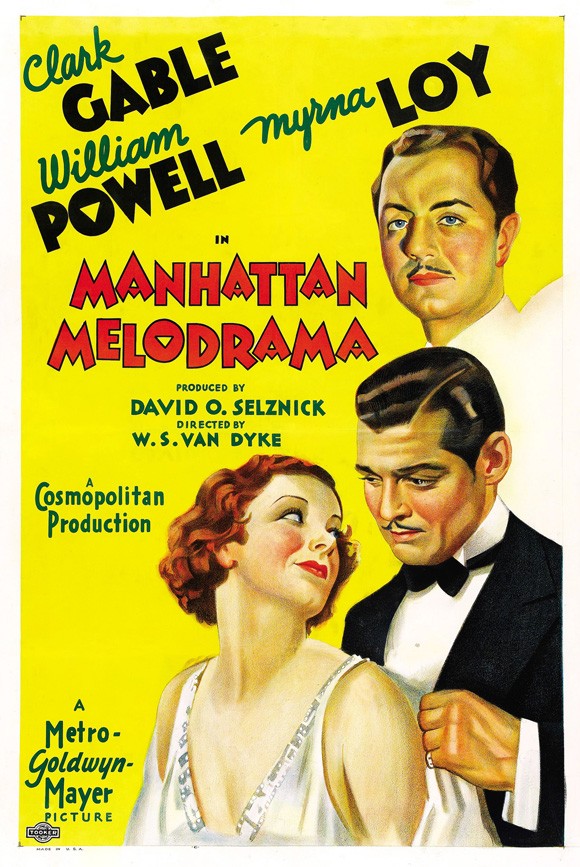
With the advent of talkies, the face of comedic cinema was forever altered. Where before the grand, physical gesturing of vaudeville, and the Chaplins, Keatons, and Lloyds that came out of that tradition, dominated the silver screen, a new kind of comedy was born. Even though it contained the words "screw" and "ball", it didn't indicate sex-themed bedroom farces: the screwball comedy was defined by featuring boisterous characterizations, byzantium premises that hinged on misunderstandings, and most importantly, quick, rapid-fire dialogue. Having the lead characters be reporters or cads wasn't uncommon either.
Though the Howard Hughes-produced adaptation of Ben Hecht and Charles MacArthur's THE FRONT PAGE made a big splash three years prior (complete with Oscar nods for Best Director, Best Actor, and Outstanding Production), 1934 seemed to be the breakout year for the screwball comedy. Frank Capra's IT HAPPENED ONE NIGHT was a monster hit and swept the Oscars, taking home all five major awards ("Outstanding Production", Actor, Actress, Director, and Adapted Screenplay), and remains a benchmark of the genre to this day. Also nominated for Outstanding Production that year: a cute rom-com called THE THIN MAN, which would lead to one of the most persevering film series of that era.
Interestingly enough, in between the release of those two classics, a film was released that featured stars from both films, made by one of their directors, and seems prescient of the wave of fast-talking comedies that followed. However, it only puts one foot in that camp; the other foot seems safely nestled in the melodrama genre which, with films like THE CHAMP, CAVALCADE, and LITTLE WOMEN, was occasionally a hot attraction for Depression-era audiences. But with soon-to-be megastars Clark Gable, Myrna Loy, William Powell, and Mickey Rooney, W.S. Van Dyke and George Cukor's MANHATTAN MELODRAMA proved too irresistible to ignore, and scored the one major award that didn't go home with Capra & Co. for IT HAPPENED ONE NIGHT.
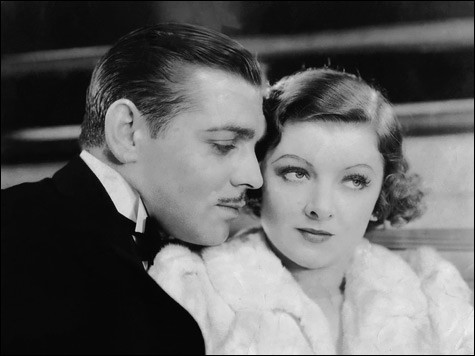
We open on the General Slocum as it floats along the East River. A young boy, Blackie, is getting his jollies vandalizing the windows and playing practical jokes on his pals, while his buddy Jim warns him against his amoral tendencies. A fire breaks out; the Slocum sinks near the Bronx, killing over 1000 people, while Jimmy and Blackie barely survive thanks to the help of a priest named Father Joe. Newly orphaned, the two are taken in by Poppa Rosen, whose own boy drowned in the accident.
Cut to 1920. As adults, Blackie and Jim have landed on both sides of the law: Blackie is a professional gambler, and Jim has just gotten a job as an assistant district attorney. Blackie plans to join his adopted brother in celebrating his appointment, but when a bet comes up that he can't resist, he sends his girlfriend, Eleanor, to meet him in his stead. When the cordial, respectful Jim impresses Eleanor with his behavior, she gives Blackie the third degree as to his plans for their future. She doesn't buy what he's selling, and hits the road.
Jim and Eleanor become an item, but Blackie seems understanding, if just raw enough to refuse Jim's request for him to participate as best man at his wedding. He's more distressed by evidence linking him to his murder of a welcher named Arnold, but some trickery on his part muddies the waters to the point that there's not enough concrete evidence for an indictment. When Jim runs for governor a while later, he's accused of having gone soft on Blackie for sentimental reasons. Blackie responds by shooting the guy making the accusations, and is promptly caught and convicted.
Because the evidence against Blackie is so airtight, Jim has no choice but to prosecute and sentence him to the fullest extent of the law, and his pragmatism is credited for clinching his governorship. He's on death row, awaiting execution, but Eleanor pleads with Jim to use his position to grant Blackie a pardon, or at the very least, a commuted sentence. When he refuses, she leaves him. Now Jim has to decide what's most important to him: sticking to his word, maintaining his elected office, his marriage, or the life of his best friend of over 20 years.
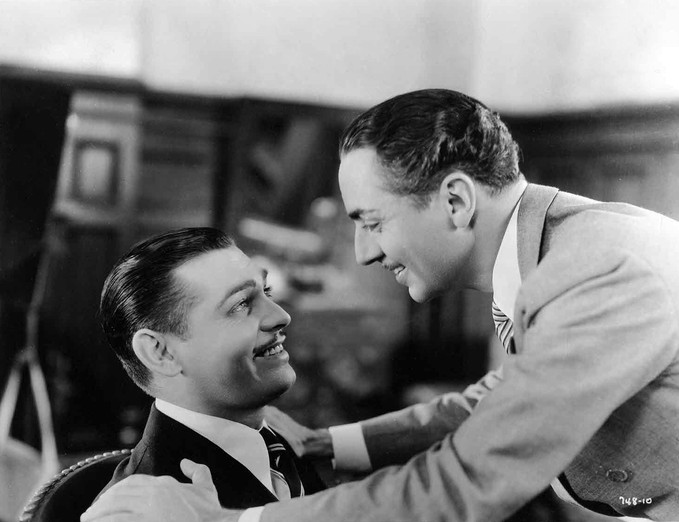
The single oddest element of this whole movie is its title. For a film titled MANHATTAN MELODRAMA, it's not particularly melodramatic. I mean, a thousand people die in the first reel, but that's all setup, and the event is barely referenced once the grown-up stars appear. The drama at the end, including Jim's dilemma and Eleanor's attempts to sway his decision, isn't really Shakespearean-level in its scale or emotional stakes; the biggest thing at stake is whether a convicted murderer (who we've seen ice two men in cold blood) will get the chair or life in prison, and whether Jim will retain his position as governor. It's fairly juicy stuff, but not really THAT melodramatic.
You can see how this plotline could easily skid off into blatant melodrama. The love triangle with Blackie, Jim, and Eleanor has countless possibilities for tension and wrought out conflict. Blackie's de-evolution to becoming a ruthless, gleefully murderous gangster, and the effect it has on his relationship with Jim, has echoes of A BETTER TOMORROW or even HEAT. When Blackie's lifelong sidekick, Spud (played by Nat Pendleton, who also co-starred with Loy and Powell in THE THIN MAN and THE GREAT ZIEGFIELD), implicates him in a murder by leaving a jacket at the scene of the crime, there's a flash where you think the likable character just may rub out his childhood pal.
But the film never really takes that route. The self-aware Blackie couldn't be any more thrilled that his beloved Eleanor is choosing an upstanding citizen over him. His murders are (somewhat) justified, and he only committed the one that buries him in order to help out his pal. He doesn't even care that much when Spud almost lands him the chair for a dumb mistake most kids wouldn't make; he's wonderfully understanding to his friend's limited mental capacity, and even keeps him around as his confidante/bodyguard. When *SPOILER ALERT* Eleanor's attempt to exonerate Blackie actually solidifies the likelihood of his execution, *END SPOILER* she could very well go all Ophelia/Lady Macbeth and devolve into madness/suicide, but somehow, her husband's admission of guilt is enough to relieve her of her guilt.
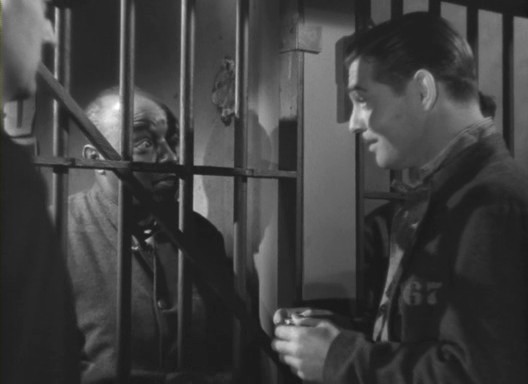
No, despite the title, MANHATTAN MELODRAMA is as much a fast-talking romantic charmer in the screwball comedy mold as it is an actual melodrama, maybe even more so. The goings on of Jim, Blackie, and Eleanor are played not to tug on your heartstrings, but to sustain your interest. Until the moral deliberations of the last reel start unfolding, there's hardly a dull moment; the time jumps, the extra-heavy sequences at sporting events and political rallies, and the occasional shooting murder help keep things moving at a brisk pace. There are cute moments and humorous sight gags throughout. When the time jumps to 1920, the title card dissolves to the 19 and 20 spots, right alongside each other, on a roulette table. There's an early appearance of an oft-repeated gag when Blackie, during his trial, appears to be scribbling notes on a legal pad, which is revealed to actually be a caricature of the harsh judge. The character of Spud, with his bad english and dim intellect, is already a stock comic relief character, but his annoying harpy girlfriend (played by GONE WITH THE WIND's Isabel Jewell) is always on hand to shriek distractingly, often while asking for a hot dog (I'm not making that up). The plot may welcome melodrama, but the tone and style of the film never indulges it.
A large part of this may be due to the actors in the lead roles, and their choices in portraying their respective characters. Clark Gable, particularly, was a newly christened star after IT HAPPENED ONE NIGHT broke him out three months prior, and seems to be content to charm his way right through the proceedings. This actually becomes one of the film's strongest assets; Blackie's understanding, carefree attitude distinguishes him from the countless cinematic gangsters that came before and since. We keep waiting for Blackie to turn sour at his failed romance, his strained friendship with Jim, and eventually, his death row sentence, but it never happens. Gable's always got a spring in his step and a smile curling on the edge of his lips, so we never feel sorry for him. By the end, *SPOILER ALERT* when he's being carted off to Old Sparky after refusing a commuted sentence, and placating the distraught Jim with statements like "If I can't live the way I want, then at least let me die when I want," and "So long, kid," *END SPOILER* we kind of envy his unflappable optimism. It's that kind of uber-confident, impossibly-cool performance that only movie star royalty of that era seemed to evoke as effortlessly as Gable does here, and it's hard to hinge anything truly tragic around such a character.
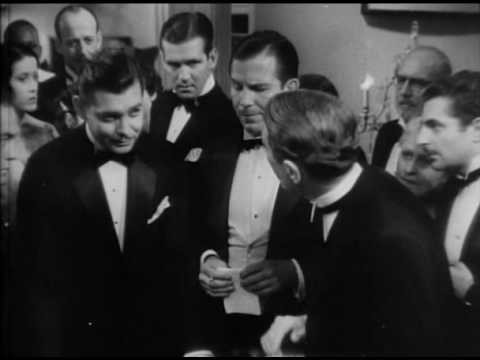
His two co-stars are equally culpable. William Powell and Myrna Loy acted in a total of 14 films together, and the majority of them (including the 6 THIN MAN features and LIBELED LADY) were fast-talking comedies, and that's what I tend to associate their dynamic with. As soon as Eleanor meets Jim, they fall into that familiar repartee, and you immediately see the potential for a romantic connection, even though she's still shacked up with the film's lead. Even though this was their first movie together, Powell and Loy seem as familiar to one another as Nick and Norah Charles from their first scene on, and their legendary back-and-forth dictates that they must end up together romantically.
There's no tension in their relationship; we are familiar enough with their screen identities that we know they're right for one another, and they both seem to know it too. When Eleanor grills Jim towards the end, it's more of the kind of nagging Norah lays onto Nick for continuing his detective work in the first THIN MAN than any deeply emotional pleading. This isn't to the detriment of the film; rather, the star power of Loy and Powell (not to mention Gable) is a big part of what makes the film sing. These are actors who we (we meaning I) love to see, and doing what we (again, meaning I) love to see them do most. Mickey Rooney also pops up (already famous from the "Mickey McGuire" short films, but not yet a superstar) as young Blackie, and does his rapscallion thing in the front section of the picture to establish the character's mischievous, anti-authority tendencies. These actors aren't stretching their personas outside of their comfort zones, but are doing what American movie stars of the studio era did best: be so charming and irresistible as "themselves" that you can't help but watch them run the same laps again and again.
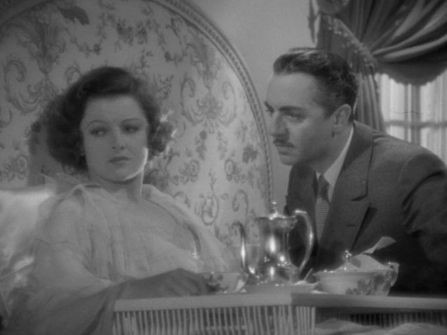
The Academy awarded Arthur Caesar for his Original Story, but ignored credited screenwriters Oliver H.P. Garrett and Joseph L. Mankiewicz. Caesar was a B-movie writer whose other output of note consists of credits on THE LOVES OF EDGAR ALLEN POE (a BNAT 15 pick featuring Harry's distant relative, Linda Darnell) and the MST3Ked I ACCUSE MY PARENTS. On the other hand, Garrett contributed to the scripts for the Oscar-winning A FAREWELL TO ARMS and two more David O. Selznick productions: the Oscar-nominated DUEL IN THE SUN, and in an uncredited capacity, the Gable-starring GONE WITH THE WIND. A multi-talented writer/producer/director, Mankiewicz is something of a Hollywood legend for his participation in films like THE PHILADELPHIA STORY, THE GHOST AND MRS. MUIR, ALL ABOUT EVE, JULIUS CAESAR, THE BAREFOOT COUNTESSA, and SUDDENLY, LAST SUMMER, and earned a total of 10 nominations throughout his career, winning four.
I don't know why the Academy honored Caesar's "Original Story" (starting in 1940, the award would co-exist with Best Original Screenplay for 17 years before they melded into one category), because I'd say the bulk of what makes the screenplay work is the micro, not the macro. The titular "melodrama" of the film isn't that inspired; a friendship is tested by a woman, a lawyer is conflicted between his loyalties to his friend and to his post, etc. Two early, tragic scenes are never referred to once they're over, and do precious little in setting up the characters of Blackie and Jim. But, like I said before, the film is never dull, and a large part of that is the liveliness of the individual scenes themselves. Blackie's final act seems illogical and bonkers, but his dialogue, matched with Gable's charisma, renders it into a human stab at redemption and dignity.
Director W.S. Van Dyke and George Cukor, who came in to direct additional scenes when Van Dyke was already working on THE THIN MAN (which would receive a nomination for Outstanding Production) with Loy and Powell, also seem to have had a hand in shaping the breezy tone of the film. Van Dyke directed four of the six THIN MAN pictures (and probably would have directed the last two, had he not killed himself in 1943), as well as the Johnny Weissmuller TARZAN THE APE MAN and the Gable/Spencer Tracy vehicle SAN FRANCISCO (which would earn him the second of his two Oscar nominations for Best Director).
Cukor, whose LITTLE WOMEN had already made a star out of Katherine Hepburn, would, like Mankiewicz, become Hollywood royalty for films like THE WOMEN, the Mankiewicz-produced PHILADELPHIA STORY, GASLIGHT, ADAM'S RIB, and MY FAIR LADY, hardly the sappiest films coming out of the first half-century of sound film. MANHATTAN MELODRAMA seems way more like those entertaining, audience-friendly pictures than the work of someone like Douglas Sirk, so I have to credit Van Dyke and Cukor alongside Garett and Mankiewicz for elevating the rudimentary narrative into something unique, engaging, and memorable.
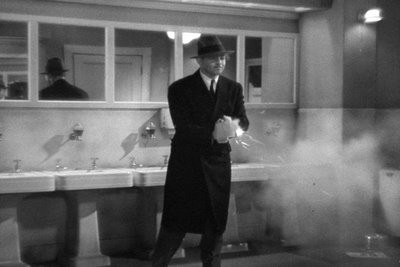
Alas, Caesar is the only person who took home an award for MANHATTAN MELODRAMA that night. On the night when Gable's IT HAPPENED ONE NIGHT pulled off the feat of sweeping all the major awards, which only ONE FLEW OVER THE CUCKOO'S NEST and SILENCE OF THE LAMBS have achieved since, the Academy placed the other, relatively small-fry Gable flick alongside it in the annals of Oscar history. Despite its heavy star power, both in front and behind the camera, the film is still best known for being the feature playing at the Biograph Theater in Chicago the night John Dillinger was shot down outside (a great scene in Michael Mann's PUBLIC ENEMIES shows Dillinger, in his final moments, grinning while watching Gable's gangster character charm and shoot his way through the narrative). While the studio capitalized on the skirmish in the film's marketing (a move which caused a vocal outburst by the reliably outspoken Myrna Loy, allegedly Dillinger's favorite actress), William Randolph Hearst removed his Cosmopolitan Productions banner from the movie's credits to distance himself from the association.
But forget Dillinger, the title and even the Oscar for a second. You got a 1934 movie with Clark Gable, William Powell, and Myrna Loy released within months of IT HAPPENED ONE NIGHT and THE THIN MAN. You got W.S. Van Dyke directing romance scenes with Powell and Loy before their four THIN MAN pictures together. You got George Cukor doing uncredited work before becoming THE George Cukor, actually getting work done for David O. Selznick (who would later fire him off of GONE WITH THE WIND, allegedly for wanting Katherine Hepburn for Scarlett O'Hara and his reputation as a "woman's director"). You have an ostensibly romantic comedy script co-written by Joseph Mankewicz before ALL ABOUT EVE, THE BAREFOOT COUNTESSA, or GUYS AND DOLLS. You have pre-superstar Mickey Rooney causing trouble and getting into fights front-and-center for the first reel of the picture. You have cinematography from legendary lenser James Wong Howe, before he'd earn the first of his 10 Oscar nominations and two wins (for THE ROSE TATTOO and HUD). You even have the first incarnation of the classic song "Blue Moon," written by Lorenz Hart and Richard Rogers, appearing here in a rough form entitled "The Bad In Every Man" (the lyrics would be softened by Hart himself for wider appeal).
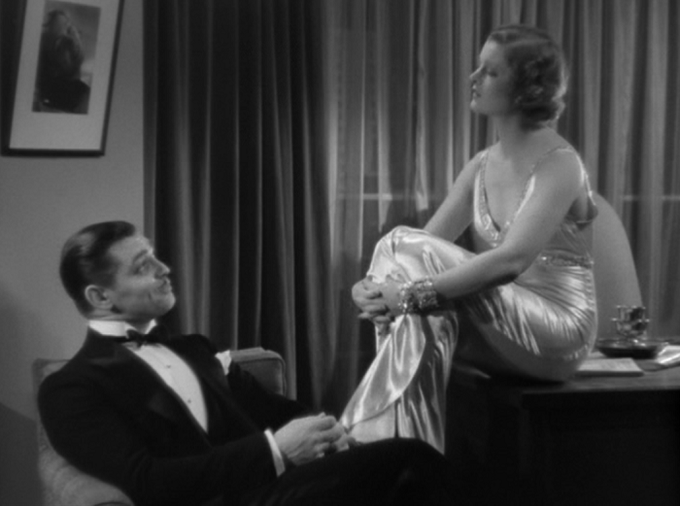
So what if the there's a slightly puritanical subtext to the whole thing. So what that some critics (such as Morduant Hall of the New York Times) dismissed the film for its "mechanical plot which is scarcely worthy of the cast." So what that the film is called MANHATTAN MELODRAMA, and isn't even really a melodrama. Despite a few patchy areas, such as blatantly outdated views of communism and race relations, Paul W.S. Van Dyke and George Cukor's flick plays great 80 years later (my, does Mickey Rooney got some years on him). Even if Arthur Caesar's "story" is maybe the last aspect of this film I would honor, I really am not in the position to pick apart the alchemy that ended up creating this fun, engaging, and memorable flick. It certainly keeps the film in the sights of film historians and film buffs alike, even if the win highlights a lesser aspect of the film.
But if you haven't seen it? Forget everything I've written about MANHATTAN MELODRAMA for a second. Just look at that roster and tell me you have no interest in checking this movie for yourself. If you said as much and claimed to be a serious film fan, I'm sorry, but I wouldn't believe you.
PREVIOUS ENTRIES:
UNDERWORLD (1927): Best Writing (Original Story)
SEARCHING FOR SUGAR MAN (2012): Best Documentary
THE BROADWAY MELODY (1929): Best Picture
THE IRON LADY (2011): Best Actress
THE BIG HOUSE (1930): Best Writing, Best Sound Recording
IN A BETTER WORLD (2010): Best Foreign Language Film
TABU (1931): Best Cinematography
LOGORAMA (2009): Best Short Film (Animated)
BAD GIRL (1931): Best Director, Best Adapted Screenplay
DEPARTURES (2008): Best Foreign Language Film
CAVALCADE (1933): Best Picture, Best Director, Best Art Direction
TAXI TO THE DARK SIDE (2007): Best Documentary Feature
-Vincent Zahedi
”Papa Vinyard”
vincentzahedi@gmail.com
Follow Me On Twitter
